PESA Act: A symbol of social harmony
Celebration, concern and contemplation on the Silver Jubilee of PESA
on 24 December 2021
Am in a big dilemma today on the silver jubilee of PESA Act. The dilemma is about whether I should celebrate its coming of age and turning into an adult or worry about its continued miserly state or think about how we can improve its implementation.
I want to celebrate because even after 25 years the law still remains relevant. In the last 25 years, the issues of the Fifth Schedule areas remain the same as written in the law. Rights related to water-forest-land; to establish the Panchayati Raj system according to the customs-policies-tradition of local people; to provide Gram Sabha and Panchayats autonomy and make them institutions of self-governance. In short, establishing direct democracy in each of the villages and PESA is such a link that ties the entire Fifth Schedule areas with a common cause and connects them with each other.
Misfortunately even after having such a good structure of law it is hardly being implemented on ground. Even today its nodal department is not clear in various states. Somewhere it is the Panchayat department and at other places it is the tribal department. Even today, the process of making rules for its implementation is yet to happen in four major states with highest tribal population i.e. Chhattisgarh, Madhya Pradesh, Odisha and Jharkhand. Even today there is dearth of field staff to implement its provisions despite budgetary support being there in centrally sponsored scheme of Rashtriya Gram Swaraj Yojna. Worst no meetings are held by ministry of panchayati raj or state nodal departments to review it. But the biggest concern for me is that even after 25 years a large section of the society and government has not understood its basic spirit.
It is this concern that leads me to ponder as to where it is lacking in its implementation. What is there in PESA that makes politicians and government bureaucrats afraid to even talk about it? Why does all the society think that with the full implementation of PESA, the tribal society will get all the rights and others would get disenfranchised?
There is an urgent need to remove these misconceptions and misinterpretations by reading the Act and rules rather than going by what is understood through hearsay. As article 40 of the Constitution sees Gram Sabha/Panchayats as units of autonomous governance, this autonomy in fifth scheduled areas is in accordance with Article 243 M of the Constitution which provides for certain exceptions and modifications mentioned in the PESA. Thus the 29 subjects under the 11th Schedule of the Constitution, which includes education, health, roads, water, electricity and all the development works, including review, control of funds, functions and functionaries of all 29 subjects are all operated in the fifth schedule areas only through PESA. Apart from PESA, no other law exists at present through which these subjects can be implemented.
Therefore while reading PESA one has to basically keep in mind that it empowers all the people living in Fifth Schedule areas through Gram Sabha and Panchayats without benefitting any particular class, especially the Aadivasis.
In states such as Madhya Pradesh and Chhattisgarh you will find that there is reservation for Scheduled Castes (SC) and Other Backward Classes (OBC) in the Panchayati Raj system under the sections mentioned for PESA in their panchayati raj act. In places where the post of Sarpanch/President is reserved for Scheduled Tribes, the post of Up Sarpanch/Vice President is reserved for SC or OBC. Therefore, PESA is does not making any distinction for any class of the society and gives leadership opportunities to all.
Simultaneously, wherever PESA talks about customary traditions, it does not emphasize on the customary tradition of any particular class, but empowers and enables the Gram Sabha to protect and preserve the customary tradition of all the societies residing in the Fifth Schedule Areas.
Therefore, implementation of PESA to its fullest is in the interest of all the societies, all the organisations, except a few bourgeoisie and the political class who want to keep all the power and resources in their own hands. To realize Gandhi's vision of 'Gram Swaraj', decentralization of power has to happen. However no government wants decentralization of powers and resources. All the profits from the centralized system are going in the hands of few and PESA shows the way to get rid of it. PESA is a glimmer of hope for the residents of fifth schedule areas forced to lead a sub-standard life even after independence.
After 25 years this is everyone’s chance to open this closed fist controlling all the powers and resources. For this all the communities will have to come together despite their differences and diversity and rise above their identity as ST, SC, OBC, or Dalit so as to unite in the form of villages belonging to fifth schedule areas. Only then will the villages would be realised as a republic, only then Mawa Nate - Mawa Raj will become possible, only then there would be self-rule in villages, only then there will be Abua Dishum - Abua Raj and only then there a direct democratic government would get established in villages.
That's why on this twenty-fifth anniversary of PESA people of Fifth Scheduled areas have to come forward for its implementation. No one else will implement it, especially the governments. We will have to do it ourselves as member of Gram Sabha, as Panch and Sarpanch, as member/President/Vice President of Block/District Panchayats. We will have to form our own democratic Gram Sabha government in our villages according to our customary traditions. Then we will be able to manage the legacy of self-rule given by our ancestors through the legal framework of PESA.
Ashwani Kange
Social Thinker
Kanker, Chhattisgarh Mo.7000705692


No comments:
Post a Comment